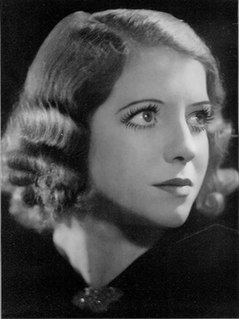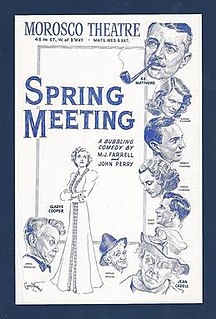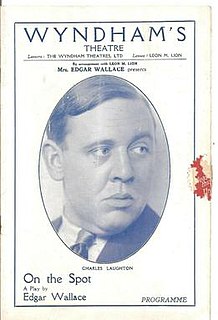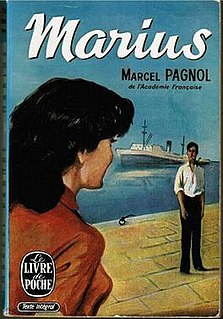
Marjorie Browne (1910–1990) was a British musical theatre actress who made occasional films.

John Peter Wearing is an Anglo-American theatre historian and professor, who has written numerous books and articles about nineteenth and twentieth-century drama and theatre, including The Shakespeare Diaries: A Fictional Autobiography, published in 2007. He has also written and edited well-received books on George Bernard Shaw, Arthur Wing Pinero, extensive reference series on the London theatre from 1890 to 1980, and theatrical biographies, among other subjects. As a professor of English literature, Wearing has specialised in Shakespeare and modern drama.

Jeanne de Casalis was a Basutoland-born British actress of stage, radio, TV and film.
Harry Acres was a British composer of film scores. He was musical director for a number of years during the 1930s at British International Pictures's Elstree Studios. Acres tended to be involved with the studio's light comedies and musicals, rather than more serious and expensive historical films.
Dorothy Irene de Singleton Dewhurst was an English stage and film actress. Born in 1886 in Sale, Cheshire, England, she was married to the actor George Bernard Copping, who predeceased her. She died on 12 December 1959 in London.
These Foolish Things was a British revue show. First staged on 12 September 1938 at the Hippodrome in Brighton, it enjoyed a lengthy West End stage run at the London Palladium from 28 September 1938 to 3 June 1939, encompassing a total 489 performances. Featuring in the line-up were The Crazy Gang along with the Sherman Fisher Girls. The show was produced and directed by George Black, who also co-wrote it along with Bert Lee and Harris Weston.

Spring Meeting is a 1938 British comedy play written by M.J. Farrell and John Perry. It was a hit in the West End, running for 310 performances at the Ambassadors Theatre between May 1938 and March 1939. Directed by John Geilgud, The cast included Niall MacGinnis, Edmund Breon, Nicholas Phipps, Joyce Carey, Zena Dare, Betty Chancellor and Margaret Rutherford. Rutherford's performance in particular attracted strong reviews. From December 1938 a Broadway version ran at the Morosco Theatre with a cast including Gladys Cooper and A.E. Matthews, lasting for 98 performances.

On the Spot is a 1930 Chicago-set play by the British writer Edgar Wallace. Wallace was inspired by a visit to the United States and, in particular, the Saint Valentine's Day Massacre. Known as a prolific author, he reportedly dictated the manuscript for the play in just four days. It was his greatest theatrical success.
The Calendar is a 1929 play by the British writer Edgar Wallace. It is a crime thriller set in the world of horse racing world, the sport being among Wallace's interests. The protagonist is a financially struggling racehorse owner with a shady reputation. It premiered at the Palace Theatre in Manchester before transferring to Wyndham's Theatre in the West End.
The Mouthpiece is a 1930 crime play by the British writer Edgar Wallace. It was one of several theatrical failures written by Wallace following the enormous success of On the Spot, with a plot described as "flimsy".
The Old Man is a 1931 mystery play by the British writer Edgar Wallace. Its original production was staged at Wyndham's Theatre in London's West End for a ninety performance run. It is set entirely in the "Coat of Arms" tavern where a mysterious old man lurks in the background, reputedly an escapee from a lunatic asylum. The original cast included Alfred Drayton, Jack Melford, Harold Warrender and Finlay Currie.
The Terror is a 1927 mystery thriller play by the British writer Edgar Wallace. It is based on Wallace's 1926 novel The Black Abbot.
Smoky Cell is a thriller play by the British writer Edgar Wallace first staged in 1930. In America a group of detectives hunt down a notorious racketeer.
The Outsider is a play by the British writer Dorothy Brandon. It portrays the struggle of an unorthodox medical practitioner to gain acceptance by the medical establishment. It was subsequently revised to show the unconventional triumphing over the conventional, whereas the play had originally had the opposite ending.

The Queen Who Kept Her Head is a 1934 historical play by the British writer Winifred Carter. It is based on the life of Catherine Parr, the sixth and final wife of Henry VIII, who outlived him.

Marius is a 1929 play by the French writer Marcel Pagnol. It takes place in Marseilles, where a young man named Marius working in a café dreams of going to sea, his obsession eventually overcoming his developing romance with Fanny, a local girl.
Betty Jardine was a British stage and film actress.
Dudley Leslie (1905–1998) was a British screenwriter and playwright. He was on the jury for the 1958 Cannes Film Festival.

Margaret Halstan was a British stage, radio, television and film actress. In theatre and film roles she often played upper-class ladies of the gentry, with a career spanning over six decades. She was particularly known for her Shakespearian roles, having debuted in 1895, at the turn of the century she joined Sir Frank Benson theatre company, and also played in the theatrical company's of Sir George Alexander and Sir Herbert Beerbohm Tree, before making her debut in silent film in 1916.

The Innocent Party is a 1938 comedy play by the British writers H.M. Harwood and Laurence Kirk. A woman has to decide whether she is needed more by her husband or her lover.









